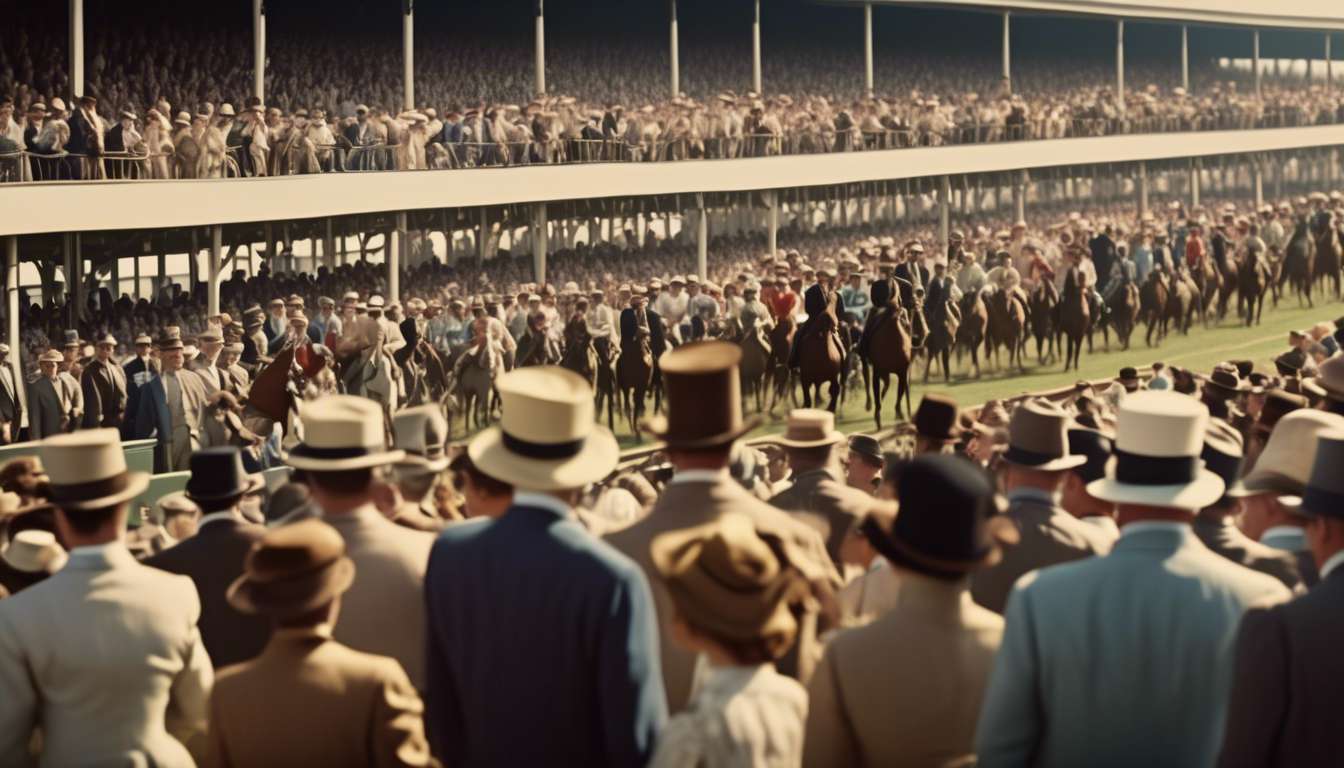The Rich Tapestry of Sports Betting in America
We find ourselves fascinated by the rich tapestry of sports betting in America, a phenomenon that has woven its way into the fabric of our culture. As we embark on this exploration of its origins, we uncover a story that dates back to the early days of the nation, when betting was not just a pastime but a reflection of societal shifts and economic aspirations.
Early Days and Horse Racing
- In the 19th century, informal wagers were placed on horse races.
- Gentlemen gathered not just for the thrill of the race but for the excitement of the gamble.
Prohibition and Underground Betting Rings
- The tumultuous years of prohibition saw the rise of underground betting rings.
- These rings defied legal boundaries, continuing the tradition of betting despite restrictions.
Evolution into a Regulated Industry
By understanding these roots, we gain insight into how sports betting has evolved into the regulated industry we know today, shaping how we engage with sports and chance.
Early Origins of Sports Betting
Sports betting in America traces its roots back to the 19th century when horse racing began capturing the public’s interest. Horse racing wasn’t just a sport; it was a community experience that brought people together, creating a shared culture around the excitement of wagering.
We can imagine ourselves standing shoulder to shoulder with fellow enthusiasts, feeling the thrill of the races. As we delve into the early origins of sports betting, we recognize how this pastime became a cornerstone of social gatherings and a way for people to connect over a common passion.
The desire for legalization grew as the popularity of horse racing and sports betting surged.
- We wanted a way to engage in this activity without the shadow of illegality hanging over us.
- This push for legalization was about more than just placing bets; it was about legitimizing a beloved pastime.
- It was also about ensuring that we could continue to enjoy the camaraderie and excitement that sports betting brought into our lives.
Horse Racing and Wagering
In the bustling world of 19th-century America, horse racing became the epicenter of wagering, bringing people together in a shared thrill of competition and chance. As tracks popped up across the country, we discovered that placing a bet on our favorite horse wasn’t just about winning money; it was about being part of a vibrant community.
The roar of the crowd and the pounding of hooves on the track created an atmosphere where we felt connected, united by the excitement of sports betting. Horse racing wasn’t just a pastime; it was a cultural touchstone, a place where we found camaraderie.
As the popularity of horse racing soared, so did the need for regulation. We saw the push for legalization intensify, shaping the landscape of sports betting in America. Legalized betting ensured fairness, attracting even more enthusiasts to our ranks.
Through shared experiences and common goals, horse racing enriched our lives, weaving us into the fabric of American history.
Influence of Colonial America
In Colonial America, the early seeds of betting culture began to take root as settlers engaged in informal wagers on various activities. Among these, horse racing stood out as a favorite pastime, bringing communities together in shared excitement and anticipation.
We found ourselves gathering around makeshift tracks, betting on which horse and rider would triumph. This communal experience laid the foundation for what would eventually evolve into organized sports betting.
As the colonies grew, so did the desire to formalize and regulate these activities. The push for legalization began to take shape as settlers recognized the potential benefits of a structured betting environment. By legitimizing horse racing, we could:
- Ensure fairness
- Safeguard our collective enjoyment
Our shared history in Colonial America reminds us of the importance of community and shared experiences. As we reflect on these early days, we see how sports betting emerged from a desire to belong and connect—a tradition that continues to thrive today.
Prohibition Era Betting Circles
During the Prohibition era, clandestine betting circles flourished as people sought ways to circumvent restrictive laws and keep the thrill of wagering alive. These secret gatherings became a haven for those who found camaraderie in sports betting, especially in horse racing, which remained a popular choice.
In these hidden circles, participants shared not just the excitement of potential winnings, but also a sense of rebellion against the constraints of the time.
Horse racing events provided the perfect backdrop for these betting endeavors. The thrill of the race, combined with the secrecy of the bets, created a community bound by a shared passion. Participants thrived in this underground world, knowing that their unity and ingenuity kept the spirit of sports betting alive even when it was frowned upon.
Though legalization was a distant hope, these betting circles laid the foundation for the eventual acceptance of sports betting. The persistence during these challenging times demonstrated:
- The enduring allure of wagering.
- The power of collective determination.
These efforts highlighted the resilience and adaptability of those who loved the thrill of the bet, even in the face of societal opposition.
Rise of Illegal Betting Activities
In the wake of Prohibition-era betting circles, illegal betting activities surged as individuals sought new ways to engage in wagering despite ongoing legal restrictions. We found ourselves drawn to the thrill and camaraderie of sports betting, a shared passion that brought us together.
Horse racing was a particular favorite. Its lively tracks and suspenseful outcomes offered an irresistible lure. Even though the law frowned upon our gatherings, the excitement of placing a bet was too compelling to resist.
As communities, we adapted by forming clandestine networks that kept our love for sports betting alive. These underground operations thrived, fueled by a shared desire for both the potential winnings and the sense of belonging they provided.
Discussions about legalization were on the horizon, but for the moment, we relied on our secretive systems to keep the spirit of betting alive. We knew change was coming, but until then, illegal betting was our way of maintaining this valued tradition.
Impact of Legal Restrictions
Legal Restrictions and Their Impact
Legal restrictions during this era didn’t just deter us; they pushed betting activities further underground, intensifying the risk and secrecy involved. When authorities cracked down on sports betting, including horse racing, we found ourselves navigating a maze of clandestine networks.
The thrill of the bet came with a heightened sense of danger, turning what should’ve been a communal pastime into a secretive affair. We yearned for a sense of belonging, but the legal landscape kept us at the fringes.
Horse Racing: The Sport of Kings
Horse racing, often dubbed the "sport of kings," was a major attraction. Yet, stringent laws restricted us, driving enthusiasts to gather in hidden venues.
We longed for a time when legalization would bring us out of the shadows, allowing us to share in the excitement openly and without fear.
Community and Hope
As we faced these challenges, our community’s resolve only strengthened. We held onto hope that one day, sports betting would become a legitimate part of our shared culture.
Transition to Legitimate Industry
Gradually, we witnessed the transformation of betting from shadowy corners to a regulated and respected industry. Together, we embraced the shift that brought sports betting into the public eye, as communities sought a sense of legitimacy and camaraderie.
Horse racing played a significant role in this transition, serving as a bridge between the old and new worlds of wagering. We found that legalization offered us a way to connect, turning once illicit activities into shared experiences that reinforced our sense of belonging.
As states began to recognize the potential benefits of legal sports betting, we saw the emergence of a structured framework that ensured fairness and safety. This shift allowed us to engage openly in an activity we long enjoyed, now with the assurance of regulation.
The legalization process united us, creating a community that valued transparency and trust. We celebrated the newfound respectability of sports betting, knowing it was a step forward for our collective passions and interests.
Modern Day Sports Betting Landscape
Today, we find ourselves amidst a thriving sports betting landscape that blends technology and accessibility like never before.
Sports betting has evolved from shadowy corners to mainstream acceptance, largely due to the widespread legalization efforts across many states. This shift has opened doors for us, creating a sense of community among avid bettors who share a passion for the game, whether it’s the thrill of the racetrack or the excitement of a last-minute goal.
Horse racing, a cornerstone of sports betting, continues to draw crowds, connecting us to a rich tradition while embracing modern innovations.
- Online platforms
- Mobile apps
These technologies have revolutionized how we engage, making it easier than ever to join in on the action from the comfort of our homes.
As we navigate this dynamic environment, we become part of a diverse and inclusive group that appreciates both the strategic and social aspects of betting.
Together, we celebrate victories and learn from losses, united by our shared enthusiasm.
Conclusion
In conclusion, sports betting in America has a rich history that dates back to early origins, influenced by horse racing and colonial America.
Despite facing legal restrictions and prohibitions, the industry has evolved into a legitimate and regulated landscape today.
The journey of sports betting reflects the changing attitudes and regulations surrounding the practice in the United States, transitioning from:
- Illegal betting circles
- Modern legal avenues
This evolution highlights the dynamic nature of sports betting and its integration into American society.

